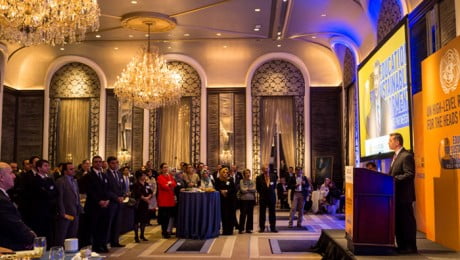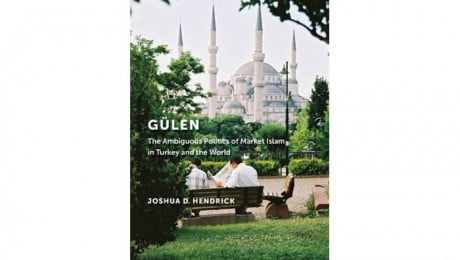Keyword: USA

The UN High-Level Reception Highlights the Role of Public-Private Partnerships
Education, along with few other factors, has been the centerpiece of the UN Post-2015 Development Agenda. During the evaluation period of the successes of the Millennium Development Goals, it was obvious that even though the number of children attending schools significantly increased, the higher education they got did not meet the standards of the contemporary world and labor markets.

Interfaith Conference – Peace Islands Institute in Connecticut
We appreciated the beauty of spring better than ever and this was one of those time “when beauty whispers to the heart.” It was the motto of a very meaningful interfaith conference organized by Peace Island Institute in Connecticut, Sacred Heart University and Fountain Magazine. Our distinguished speakers discussed the concept and expression of “Beauty” in Abrahamic traditions from two perspectives: nature and art.

Niagara Foundation’s Peace & Dialogue Awards – Michigan 2014
Niagara Foundation publicly recognizes individuals and organizations who have distinguished themselves in their profession and contributed their time, energy, leadership, and dedication to the cause of dialog, peace, understanding, education and community service.

Amir Hussain on Fethullah Gulen and Hizmet Movement
Dr. Amir Hussain is a professor of Theological Studies at Loyola Marymount University, Los Angeles. He has written numerous scholarly articles, and his area of research is on the study of Islam, specifically contemporary Muslim societies in North America.

Sophia Pandya on Hizmet Movement
Dr. Sophia Pandya specializes in women, religion, and globalization. She received her BA from UC Berkeley in Near Eastern Studies/Arabic, and her MA and PhD from UCSB in Religious Studies, with a focus on women and Islam. She co-edited the book titled The GulenHizmet Movement and its Transnational Activities: Case Studies of Altruistic Activism in Contemporary Islam.

GYV summit highlights link between education, sustainable development
GYV President Mustafa Yeşil, in his opening remarks to the UN high-level meeting, said sustainable development can only be achieved through a good education program. Yeşil said Turkish schools inspired by Islamic scholar Fethullah Gülen that have been opened in many countries around the world have achieved the level of success they have enjoyed due to sectoral support.

A rising profile for Turkish Cultural Center Vermont
The Turkish Cultural Center Vermont, a nonprofit organization, offers Turkish language classes and serves as a platform for promoting both Turkish culture and cross-cultural understanding. As a focal point for one of the many ethnic and linguistic groups that have found their way to Vermont, it has achieved noteworthy visibility.

Gülen: The Ambiguous Politics of Market Islam in Turkey and the World
The Hizmet Movement is Turkey’s most influential Islamic identity community. Widely praised throughout the early 2000s as a mild and moderate variation on Islamic political identity, the Gülen Movement has long been a topic of both adulation and conspiracy in Turkey, and has become more controversial as it spreads across the world. In Gülen, Joshua D. Hendrick suggests that when analyzed in accordance with its political and economic impact, the Gülen Movement, despite both praise and criticism, should be given credit for playing a significant role in Turkey’s rise to global prominence.

Jihad Turk on Fethullah Gulen and Hizmet Movement
Jihad Turk, a founding Board Member of Claremont Lincoln University, has been instrumental in the establishment of Bayan Claremont, a graduate school designed to train Muslim scholars and religious leaders. He previously served as the Director of Religious Affairs at the Islamic Center of Southern California.

Gülen condemns ISIL atrocities in ads in leading US newspapers
In the ads, which appeared in The New York Times, The Washington Post, The Wall Street Journal, the Chicago Tribune and the Los Angeles Times, Gülen said the actions of ISIL — referred to in the ad as ISIS, another name it goes by — are a “disgrace to the faith they proclaim and crimes against humanity.”

A rising profile for Turkish Cultural Center Vermont
Turkish Americans have fed and entertained the governor and other high officials at celebratory events. They’ve bestowed awards on local luminaries. They’ve sponsored subsidized tours of Turkey for Vermont legislators. And they’ve opened a spacious office in Burlington to serve as a gathering place both for members of their own community and as a hub for their efforts at cultural and educational outreach.

Education as a Bridging Factor of All Dimensions of the Sustainable Development
Journalists and Writers Foundation (JWF), in partnership with Peace Islands Institute, organized a discussion panel during the 2nd Session of the High-Level Political Forum on Sustainable Development at the United Nations Headquarters. The panelists discussed that education was one of the key factors that affected all dimensions of sustainable development and could enhance the integration of the dimensions in a cross-sectoral manner.

Rumi Forum Fellowship Program 2015
Rumi Forum is inviting PhD candidates and those who have recently completed there doctorates in social sciences for a study fellowship that incorporates a trip to Turkey with the mission of exploring social, economic, cultural, security and political issues in Turkey and the wider region during 2015.



















